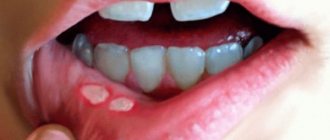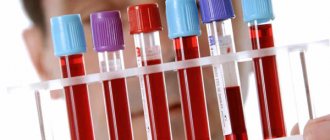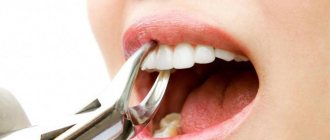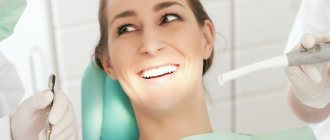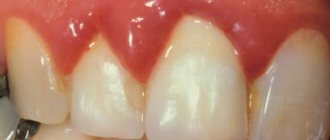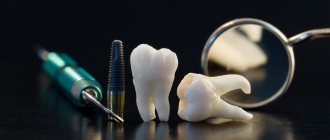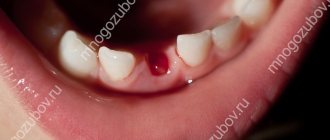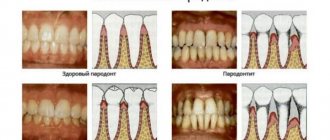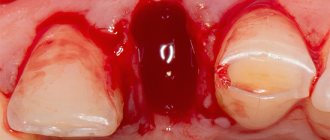Should I worry if a pregnant woman has sore gums?
If you have problems during pregnancy, you should contact your dentist. You should not hesitate, otherwise health problems may arise for the baby. Dangerous infections can enter his body.
The best time to visit the dentist is the second trimester. And in other periods, you can safely turn to a specialist for help. Only he is able to competently prescribe treatment.
The problem can be identified by symptoms, which include:
- blood during the cleaning process;
- the appearance of plaque;
- redness, swelling;
- there is pain on palpation;
- bad breath;
- discomfort when chewing solid food.
Characteristic symptoms
The main symptoms of the inflammatory process in the gums, which is why pain occurs, include:
- enlarged gums, which can cover dental crowns;
- redness and swelling of the gums;
- the appearance of pain on palpation;
- bleeding gums when brushing teeth;
- plaque formation on teeth;
- bad breath;
- discomfort when chewing hard foods.
Inflamed gum
The presence of at least one of these symptoms is a reason to visit the doctor's office for an examination. During the period of bearing a child, you cannot take risks by postponing therapy until later, because such ignoring can harm not only the expectant mother, but also the health of her baby.
At the dentist's office
Causes of gum disease
Oral discomfort during pregnancy is often associated with gingivitis. It occurs mainly due to poor oral hygiene - resulting in the formation of plaque. Another reason for the problem is hormonal changes.
Gums begin to hurt from the 3rd month of pregnancy. They change color from red to blue, swell, and bleed less often. Unpleasant sensations in the mouth may occur during eating or at rest. Sometimes ulcers appear. In the second half of the term, the condition of the mouth may deteriorate sharply - the gingival papillae and gum edges become significantly larger.
The gums near the tooth hurt (including after its removal) and for some other reasons.
All of them are complications and require prompt intervention by a specialist:
- Alveolitis is an inflammation of the hole left after tooth extraction. The presented problem arises due to non-compliance with the doctor’s recommendations. After tooth extraction, the problem arises when an infection penetrates the injured tissue, causing swelling and other complications.
- Hematoma is an accumulation of pus in the blood that has accumulated in the soft tissues.
- Trigeminal neuritis. The gums also hurt when the trigeminal nerve is injured. Visually it does not change.
- Remains of cysts, dental roots. In some cases, the pain is due to the fact that the specialist has not removed all the remains. This causes inflammation of soft tissues, headaches, and swelling.
There are cases where women develop periodontal disease due to long-term use of any medications. For example, patients with epilepsy receive special medications that reduce the amount of saliva produced. As a result, their teeth are left with virtually no protection.
What to do if your gums hurt? Seek help from a dentist for medication or surgery.
Why do gum problems occur during pregnancy?
Gums can begin to bother a pregnant woman for many reasons, but the main ones include:
- Restructuring of hormonal levels - a decrease in the number of enzymes makes mucous tissues more vulnerable to the effects of microbes.
- Toxicosis is a change in microcirculation. It can have a negative effect on gum tissue.
- Vitamin deficiency , calcium, magnesium and iron deficiency has the most negative effect on the health of bone tissue.
- Poor oral care can cause plaque accumulation, tartar growth, and the proliferation of pathogenic bacteria.
Many pregnant women refuse to use a toothbrush due to toxicosis and nausea, preferring rinsing. This does not completely clean the oral cavity and can lead to the development of inflammatory processes!
What to do if your gums hurt and bleed during pregnancy - doctor's advice
Even at the very beginning of pregnancy, the expectant mother should understand that discomfort, bleeding in the mouth and other troubles should be taken seriously. If these symptoms appear, you should contact your dentist to prevent the development of severe pathologies.
If the gums are swollen, the doctor usually prescribes a set of measures:
- Prescribes special anti-inflammatory drugs for external use. Basically these are ointments that should be kept in the mouth for several hours.
- Daily hygiene measures - cleaning, rinsing, etc.
- Professional cleaning in dentistry. Removing plaque is a very important process. The bacteria found in it can cause serious illness.
- Food enriched with microelements and vitamins.
In the early stages of pregnancy, it is important to choose the right medications. They should strengthen the gums, but not harm the child. The best option is decoctions of calendula, medicinal chamomile and sage. Hardware procedures are selected individually.
The use of potent drugs is prohibited.
Among the preventive measures you may be prescribed:
- diet;
- gum massage using a soft brush;
- vitamin complexes;
- reducing consumption of foods high in sugar;
- visiting a specialist once every trimester;
- drinking high-quality clean water.
The best treatment for teeth and gums is prevention. This way you will maintain the health of the mother and fetus. But if pharmaceutical products were nevertheless prescribed, you should make sure that they are not dangerous for pregnant women (made from lidase, acetylsalicylic acid or glucose).
How to treat gum disease during pregnancy
If the problem is not related to a deterioration of the immune system, then treatment of pregnant gums will be gentle. Such a patient should not worry about the safety of her health and the health of the baby, because cleaning the oral cavity is carried out using non-aggressive medications.
- If the reasons for the development of gingivitis are minor problems - caries (dental plaque) or tartar, then the teeth will be treated with antiseptics and subsequent cleaning.
- In the case of reduced immunity, against the background of which inflammation of the gums has developed, removal of the rotten tooth as a source of infection and maintenance therapy (taking antiseptic and anti-inflammatory drugs), as well as vitamins, are indicated.
- Mouth rinses with medicinal properties, gels and ointments are shown.
- A useful addition to the main treatment would be to prescribe hydromassage to the gums to improve blood circulation in the tissues of the mucous membrane and, as a result, speed up the recovery period.
Dental gels and ointments for pregnant women
The indication for the use of medicinal gels and ointments for pregnant women will be their pronounced analgesic and anti-inflammatory properties.
Gel for gums during pregnancy, in turn, is more effective in relieving inflammation than mouth rinses. The gel remains on the surface of the inflamed gums for a long time, while the rinse only acts while rinsing the mouth.
A common balm for sore gums is Asepta . This drug has an antimicrobial and anti-inflammatory effect, which accelerates the process of regeneration of damaged gum areas. You can also use Metrogil-dent .
Ointments have a similar effect as gels. One of the brightest representatives of this form of drugs is the ointment “ Levomekol ” or its analogue “Levosin”.
Rinse aids
The dentist will tell you what to do if your gums become inflamed during pregnancy. His first decision will be to eliminate the inflammation as soon as possible. Listerine line rinse aid or another manufacturer can best cope with this .
It is important to remember that rinse aid alone will not eliminate inflammation. In between rinses, the pregnant woman is prescribed medicinal ointments or gels to improve the quality of treatment.
Traditional recipes for inflammation and bleeding gums
Traditional medicine is aimed at relieving gum inflammation and reducing pain. Symptoms of gingivitis can be relieved with infusions of medicinal plants such as chamomile , St. John's wort , and calendula .
Some pregnant women, to enhance the anti-inflammatory effect, add solutions of chamomile and sage to the rinse with the main drug. This helps reduce discomfort for a long time.
A simple method of treatment is to rinse your mouth with table salt (1 tablespoon) dissolved in a glass of boiled water. For an antimicrobial effect, you can add propolis.
Is treatment possible with antibiotics?
Antibiotics are difficult drugs for the human body, especially during pregnancy, since their uncontrolled use entails irreversible consequences for the child, namely developmental defects in the future.
It is possible to take antibiotics , but only with the permission of the attending gynecologist or dentist if there are appropriate indications (for intoxication syndrome). It is the doctor who will select the right group of antibiotics and advise how to treat this condition.
Traditional methods of treatment
If there is swelling due to a wisdom tooth cutting out or an infection, use special preventive baths. Decoctions of sage, chamomile, and chlorhexidine solution are excellent.
You can also try some other methods if your wisdom tooth is growing:
- Place a few drops of garlic juice on the affected area. Wait a couple of minutes and rinse your mouth.
- Rinse your mouth with a solution of furatsilin or soda.
- Apply ice to the outside of your cheek.
- Perform a massage.
What else to treat? Various applications and masks help a lot. For example, a mask made from raw beets. The grated vegetable is applied to the affected area for 20 minutes.
Another excellent folk option is tar applique. Take a small amount of birch tar and use it to brush your teeth at night. After a couple of days the problem will disappear.
Potato juice can cope with inflammation quickly. Take potatoes, wash them with a stiff brush, and douse them with boiling water. Then all that remains is to grate it and apply it to the problem area for 25 minutes.
An interesting recipe - a mixture of bergenia, galangal, clove spices and tooth powder. All components need to be taken and ground. Then she brushes her teeth in the morning for a couple of minutes.
You can prepare healing gum from lemon juice, mint essential oil, honey and beeswax. The mixture is heated on the stove until it becomes homogeneous. All you have to do is wait until it cools down, make lozenges, and you can chew.
A simple way is to rinse your mouth with 10-day old kefir. The product is diluted in the ratio of half a glass of water per glass of kefir. It is necessary to rinse the affected area with it as often as possible.
In the morning and before bed, you can rinse your mouth with mumiyo (take 3 g of the substance and dissolve in 100 ml of water). The duration of use of the product is about 21 days.
You can get rid of ulcers by rinsing your mouth with infusion of golden mustache. The leaves of the plant are ground and poured with boiling water. Sea salt is added to the mixture, after which you can rinse.
Applying heat to the affected area is strictly prohibited! This will only increase the spread of pathogenic bacteria. There is also no need to apply painkillers to the painful area to prevent irritation.
Prevention.
- A balanced diet during pregnancy has a very positive effect on the condition of the gums. Food should be rich in vitamins, potassium, calcium, phosphorus. It is very useful to eat apples, pears, and carrots. In addition to consuming tons of healthy nutrients, you massage your gums by chewing fruits and vegetables. Citrus fruits are also very useful - the vitamin C they contain strengthens the walls of small blood vessels. Don't forget about fresh herbs - parsley, dill and onions. Avoid a lot of sugary foods.
- Remember to brush your teeth twice a day, and after eating, rinse with water and floss.
- The brush should be of medium hardness. At the beginning of treatment, you can use a soft one. The brush should be regularly replaced with a new one. And everyone knows that it should be purely individual.
- If you have toxicosis and vomiting, do not brush your teeth immediately after it, the oral cavity is already irritated by the acid of the stomach contents. Just rinse with water. And clean it later, in an hour.
- If your gums are bleeding, do not blame pregnancy or a weakened immune system, do not wait for it to go away on its own, contact your dentist immediately. It is important not to start the disease. The best thing to do is to warn her. Therefore, scheduled preventive examinations are very important, do not forget about them.
Painkillers during pregnancy - how not to harm the baby
Experts prescribe various antiseptic solutions to pregnant women suffering from inflammation and pain. They perfectly eliminate various types of suppuration.
It is recommended to use such drugs as:
- Iodinol;
- Furacilin;
- Trachisan;
- Chlorhexidine;
- Tantum Verde, etc.
In some cases, various antiseptic and antibacterial tablets are prescribed, for example, Grammidin, Septolete, Hexalize and others. Using them several times a day will avoid rinsing. Doctors recommend using analgesics with caution. Meloxicam, Ibuprofen, Ketorol are selected individually.
Why do almost all experts not recommend using aspirin? It thins the blood and, accordingly, can increase bleeding.
Finlepsin should also be treated with caution. Tantum Verde and Tenflex should not be taken for more than a week.
Paracetamol is prescribed by almost all specialists. The presented drug is able to penetrate the placenta, but it does not harm the fetus. The tablets have an anti-inflammatory effect.
Nurofen is prescribed in moderate doses. The product is not used in the third trimester. It can reduce the amount of amniotic fluid.
Riabal and No-shpa do no harm. They reduce pain and spasms.
As for antibiotics, they are used only if there is a pronounced inflammatory process. It is not allowed to take the presented products for longer than a week. If the nerve is damaged and there is no pain, antibiotics are not prescribed.
Causes of gingivitis during pregnancy
Throughout the fertile (childbearing) period, a woman’s body works in a cyclical rhythm, which serves the main biological purpose of a woman - reproduction. The complex hormonal balance changes throughout the monthly cycle.
The metabolism in the tissues of the whole body changes accordingly. During pregnancy, hormonal levels are rearranged and blood supply to organs is disrupted.
Gums are sensitive to changes, especially if there were any problems before pregnancy. An increase in the concentration of the hormones progesterone and estrogen in the blood increases the sensitivity of the gums to microorganisms that live in the so-called dental plaque - a soft plaque that accumulates on the teeth when they are not properly cleaned.
Often, when pregnancy occurs, the microbial composition of the dental plaque also changes due to the proliferation of bacteria there, which are suitable for new biochemical reactions for life. Inflammation of the gums occurs.
Every second pregnant woman shows signs of gingivitis.
Contribute to this:
- decreased immunity;
- avitaminosis;
- toxicoses.
Inflammation of the gums during pregnancy - hypertrophic gingivitis
Features of gum treatment after childbirth
If a woman has a wisdom tooth coming out after childbirth or her gums are swollen for other reasons, she needs comprehensive treatment. First, you should visit your dentist. He will prescribe anti-inflammatory and antiseptic medications.
If there is no improvement, problems with the immune system can most likely be diagnosed. Then the specialist prescribes general strengthening medications that will not harm the baby.
After giving birth, you should definitely go on a special diet.
It is recommended to eat foods rich in vitamins:
- in the morning you can drink carrot juice;
- Corn, peas, beans, and bread should be included in the diet (they contain vitamin E);
- It is very important to eat cabbage, spinach, tomatoes and citrus fruits. They are high in vitamin C;
- Milk, rye flour and apples contain vitamin B.
For severe bleeding in the mouth, you can use special pastes and decoctions. They should contain sage, oak bark or chamomile.
How to treat hypertrophic gingivitis
Appearance of hypertrophied gums
This type of gum problem during pregnancy is associated with an increase in the size of the outer edge of the gums and interdental papillae. In addition, there is increased bleeding.
Mild degrees of this form usually go away after the birth of the child. During pregnancy, it is enough to monitor the quality of oral hygiene and regularly visit a dentist.
More complex cases require a different approach. The patient undergoes a course of sclerosing injections. If even this method does not help, then they move on to surgical removal of excess tissue.
Important! Any such interventions can only be prescribed a few months after birth.
If the reason why loose gums appeared during pregnancy is due to incorrect fillings or crowns, then therapy is based on their correction or replacement.
Prevention of oral diseases
To prevent inflammation of the gums around the tooth, various preventive measures should be taken.
The following measures will help prevent bleeding:
- Performing a gum massage using a soft brush;
- Taking vitamins for expectant mothers;
- Reducing intake of sugary foods;
- Timely treatment of caries;
- Treatment of mouth diseases;
- Visiting the dentist once every trimester;
- Drinking high-quality clean water;
- Diet;
- Regular dental care.
If you follow the rules presented, you will not have to look for information on forums on how to deal with the problem. In addition, you will prevent the occurrence of diseases both in yourself and in your baby.
Let's look at a short story about diseases of teeth and gums during pregnancy:
Causes and associated symptoms
Inflammation of the gums is medically called gingivitis. It is observed in 75% of expectant mothers, and appears between the 2nd and 9th months of pregnancy. During this period, active hormonal changes occur in the body. Weakened immunity, high concentrations of estrogen, progesterone and prostaglandins, as well as toxicosis contribute to the development of the disease. Is the gum around the tooth very swollen during pregnancy? Perhaps the inflammatory process has intensified due to the following factors:
- non-compliance with personal hygiene rules, which contributes to the accumulation of soft plaque;
- presence of chronic gingivitis;
- malocclusion;
- problematic fillings;
- vitamin C deficiency.
In the first trimester, gum inflammation is accompanied by the following symptoms:
- puffiness or swelling;
- bleeding gums;
- painful sensations when brushing teeth;
- darkening and redness of the surface.
There is no loosening of teeth or damage to bone tissue - only the gums are affected. Bleeding occurs due to mechanical pressure during hygiene procedures or during chewing of food. If, due to pain, a woman begins to brush her teeth less often, plaque accumulates, which leads to further development of the disease.
As labor approaches, the problem worsens, turning into hypertrophic gingivitis. It is expressed by enlargement and polypous growth of gingival papillae. In this state, even normal eating becomes painful. Possible complications of the disease include periodontitis, glomerulonephritis, and infective endocarditis.
Threat of miscarriage as a consequence of the inflammatory process during pregnancy
Inflammation is always stressful for the body, so the likelihood of miscarriage in such a situation increases. Chronic inflammation poses a particular danger. They may not cause significant discomfort, but the body's immune system is activated to search for and eliminate harmful substances.
Sometimes, by mistake, the embryo is included in the cohort of pests, rejecting it. A miscarriage occurs, threatening secondary infertility. In some cases, the embryo is not expelled, but its implantation is difficult, so it can only implant in the lower part of the uterus, near the pharynx. This results in partial or complete presentation of the fetus, which threatens placental abruption and difficulties during childbirth.
When presenting, natural delivery is impossible. The only possible way out in such a situation is a caesarean section.
Miscarriage is not the only dangerous consequence of inflammation. If the pathological process is localized in the ovaries, it can lead to an increase in the size of the connective tissues inside the fallopian tubes and a narrowing of their lumen. At the same time, the work of the epithelium, which promotes the fertilized egg to the uterus, is also disrupted.
This increases the likelihood of an ectopic pregnancy. That is why, even at the stage of pregnancy planning, it is advisable to undergo an examination and make sure that there are no chronic inflammations in the body.
